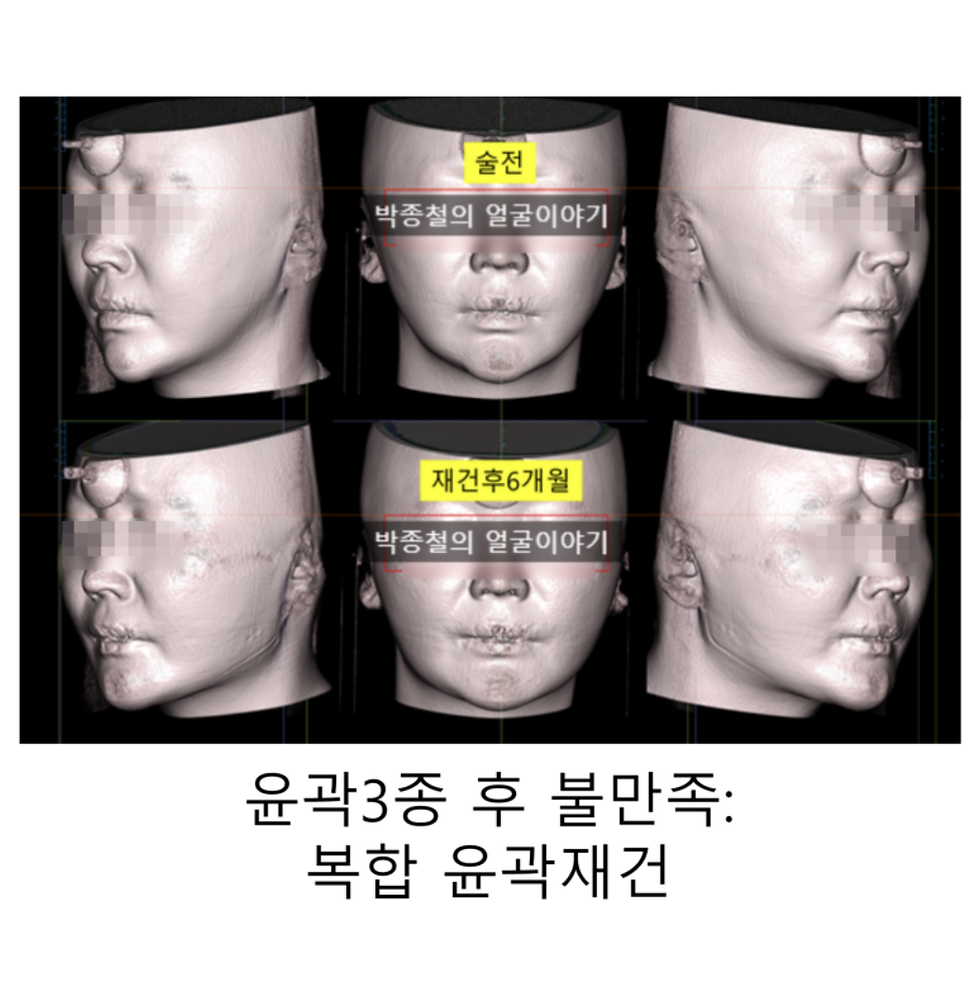10mm Genioplasty: 6-Month Follow-up on Enhanced Bone Formation and Stability with Autologous Bone Graft
- Dr. Park

- May 29, 2025
- 4 min read
Authored by Dr. Park Jong-chul, Oral and Maxillofacial Surgeon
This article provides an in-depth analysis of the significant changes and long-term stability observed in a patient 6 months post-operatively following a 10mm sliding genioplasty augmented with an autologous bone graft. The primary focus of this post is to detail the progressive increase in bone formation at the graft site over time and its positive impact on the final chin and surrounding mandibular body volume.
Sliding genioplasty, a surgical procedure for chin augmentation or correction of a retruded chin, offers the distinct advantage of excellent biocompatibility as it utilizes the patient's own bone. However, prospective patients often have questions regarding post-operative soft tissue changes and the long-term prognosis of the bone graft site. This 6-month follow-up case study aims to demonstrate the efficacy and stable outcomes of genioplasty combined with autologous bone grafting.
Patient's Pre-operative Condition and Surgical Plan

The patient presented with a retruded chin, slightly deviated to the right, and a desire to improve a relatively weak chin profile exacerbated by a tendency towards bimaxillary protrusion. A comprehensive diagnostic evaluation led to a surgical plan involving a 10mm sliding genioplasty using a medical-grade titanium plate. To achieve overall facial harmony, the genioplasty was performed concurrently with zygoma reduction, mandible angle reduction, and buccal fat removal.
A critical aspect of genioplasty is ensuring a natural transition and adequate volume between the advanced chin segment and the native mandibular body. To address this, an autologous bone graft was utilized to fill potential gaps and prevent step-off deformities or indentations, thereby creating a smooth, continuous jawline. Additionally, submental liposuction and an Elasticum® lift were performed to enhance cervical definition.
6-Month Post-Genioplasty: CT Analysis Findings
A detailed analysis of CT scans taken 6 months post-surgery revealed the following key observations:
Soft Tissue Stabilization and Natural Final Contour: Compared to the pre-operative state, the patient's jawline demonstrated a significantly more defined and natural contour. The augmented volume of the advanced chin segment was well-maintained, contributing to improved overall facial balance and harmony.

턱끝전진술 술 후 6개월: CT 분석 Sustained Improvement in Facial Asymmetry: The correction of facial asymmetry achieved through surgery remained stable at the 6-month follow-up. The site of the right cortical ostectomy also showed good healing and harmonious integration with the surrounding soft tissues.

턱끝전진술 술 후 6개월 정면 이미지: CT 분석 Maintenance and Enhancement of Chin Body Volume – Successful Autologous Bone Graft: A common concern with genioplasty, particularly with significant advancements, is the potential for a noticeable step or depression between the advanced chin segment and the mandibular body. In this patient's case, this possibility was proactively addressed during the surgical planning phase. The autologous bone graft was meticulously placed in areas susceptible to volume deficiency or gapping created by the chin advancement. At 6 months post-operatively, CT imaging confirmed that the chin advancement was successfully maintained, and the transition to the surrounding mandibular body was smooth and voluminous. This outcome underscores the success of the autologous bone graft in achieving a natural result despite a substantial 10mm advancement, demonstrating its effective integration and functional role.

턱끝전진술후 턱끝 체부 볼륨의 유지 및 개선 
Sagittal view CT scan at 6 months post-genioplasty
Key Insight: 3-Month vs. 6-Month Post-Genioplasty CT Comparison – Positive Changes at the Bone Graft Site
To evaluate the temporal changes at the bone graft site following genioplasty, CT scans from 3 months and 6 months post-surgery were comparatively analyzed. This comparison yielded highly encouraging findings: the area where the autologous bone graft was placed (connecting the advanced chin segment and the mandibular body) exhibited increased bone density and evidence of new bone formation at 6 months compared to 3 months.

This progressive osteogenesis at the graft site leads to a more robust and natural integration between the chin and the mandibular body, ensuring long-term volume stability. Furthermore, the firm skeletal support provided by this consolidated bone structure contributes to a more natural and resilient appearance of the overlying soft tissues.

Stable Positioning of the Advanced Chin Segment
A 3D CT assessment at the 6-month mark reconfirmed that the advanced chin segment was securely maintained in its planned, corrected position. This indicates the precision of the surgery and the successful osseointegration of the bone segments.

Conclusion: Successful Mandibular Body Volume Changes and Long-Term Stability after 10mm Genioplasty with Autologous Bone Graft
This 6-month follow-up of a 10mm genioplasty case highlights an important principle: even with significant advancements, meticulous surgical planning combined with the appropriate use of an autologous bone graft can effectively prevent volume deficiencies in the chin-mandibular body transition zone. When the graft successfully integrates and stimulates new bone formation, it leads to natural, aesthetically superior, and, critically, long-term stable results.
The observation of progressive bone formation at the graft site over time is a highly positive prognostic indicator, enhancing the stability and durability of the surgical outcome.
For individuals considering treatment for a retruded chin, a thorough understanding of the benefits of genioplasty utilizing their own bone (autologous grafting) is crucial. It is paramount to consult with an experienced Oral and Maxillofacial Surgeon for a comprehensive evaluation and to develop a personalized, safe, and effective surgical plan.
We remain committed to providing patients with accurate and beneficial medical information. Thank you.




Comments